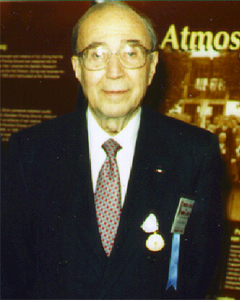Dr. Herman H. Goldstine
 Dr. Herman H. Goldstine was
born in Chicago, Illinois on September 13, 1913. He completed undergraduate studies at the University of Chicago
in 1933 with a BS in Mathematics and went on to earn his MS and PhD in the same field at his alma mater in 1934
and 1936. He was later awarded an honorary PhD from the University of Lund, Sweden (1974), and honorary doctorates
of science from Amherst College and Adelphi University, both in 1978. He served as a research assistant in the
Department of Mathematics at Chicago from 1936 to 1937, then continued his academic career as an instructor and
assistant professor at the University of Michigan between 1937 and 1942.
Dr. Herman H. Goldstine was
born in Chicago, Illinois on September 13, 1913. He completed undergraduate studies at the University of Chicago
in 1933 with a BS in Mathematics and went on to earn his MS and PhD in the same field at his alma mater in 1934
and 1936. He was later awarded an honorary PhD from the University of Lund, Sweden (1974), and honorary doctorates
of science from Amherst College and Adelphi University, both in 1978. He served as a research assistant in the
Department of Mathematics at Chicago from 1936 to 1937, then continued his academic career as an instructor and
assistant professor at the University of Michigan between 1937 and 1942.
During World War II, he was an Army officer assigned to the Ballistics Research Laboratory at Aberdeen Proving Ground, with duty station at the Moore School of Engineering, University of Pennsylvania at Philadelphia. He and others soon concluded that the Bush Differential Analyzer, then the leading mechanical calculator, was not up to the high speed mathematical calculations needed for the development of ballistics tables. Together with John Mauchly, a staff member at the Moore School, who provided conceptual guidance, and Presper Eckert, Jr., a graduate student, a prototype of the Electronic Numerical Integrator and Computer (ENIAC) was designed. Lieutenant, and later Captain Goldstine served as resident project supervisor for the Ordnance Department, but he also provided critical mathematical components and early operating routines, or what are now termed programs. The ENIAC was in operation by the fall of 1945, by which time Captain Goldstine was helping to develop a second generation computer, the Eletronic Discrete Variable Computer.
From 1946 to 1957, he was an associate, and later acting project director for the Electronic Computer Project at Princeton University's Institute of Advanced Study. He was subsequently associated with IBM as Director of their Mathematics Sciences Department and later as Director of Scientific Developments. In 1969, he was appointed Executive Officer of the American Philosophical Society in Philadelphia, the nation's oldest private scholarly organization, from which post he is now retired.